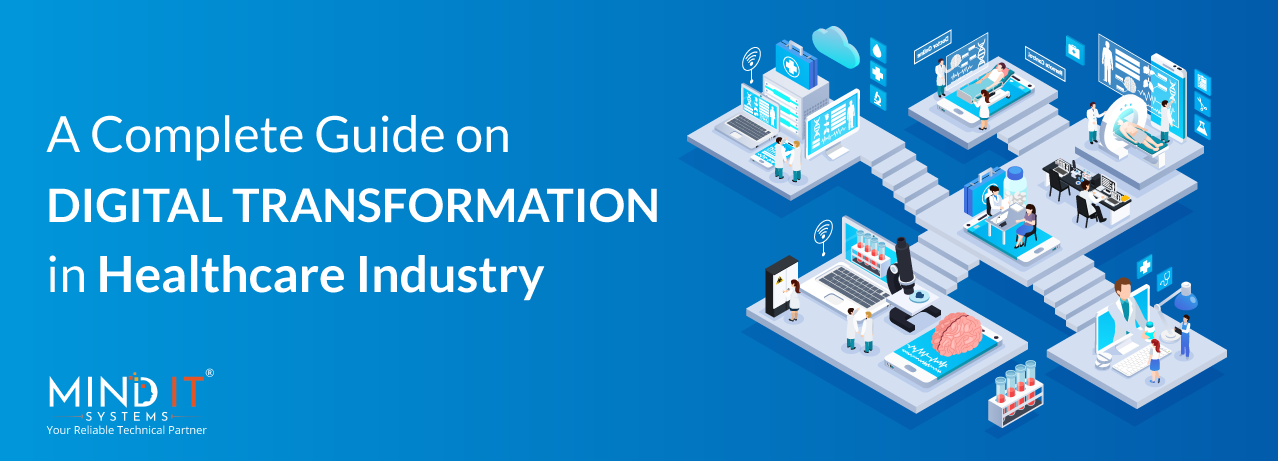
A Complete Guide on Digital Transformation in Healthcare Industry
Introduction
Digital transformation is reshaping industries worldwide, and the healthcare sector is no exception. With the assistance of advanced technologies and digital solutions, the healthcare industry is undergoing a revolution in improving patient care, optimizing medical processes, and enhancing overall outcomes in healthcare.
This comprehensive guide delves into the concept of digital transformation in healthcare, exploring its growth, challenges, significance, emerging trends, use cases, and potential impact on the future of healthcare.
So, let’s first understand what digital transformation is in healthcare..
What is Digital Transformation in Healthcare?
Digital transformation in healthcare is a shift driven by technological innovations reshaping the medical landscape. It encompasses various elements, such as electronic health records (EHRs), telemedicine, artificial intelligence (AI) diagnostics, health monitoring wearables, and more. These technologies work in tandem to enhance efficiency, accessibility, and overall patient outcomes.
The integration of EHRs allows healthcare providers to digitize and consolidate patient records, eliminating the inefficiencies of traditional paper-based systems. It not only improves data accessibility but also enables seamless information exchange between different healthcare entities, facilitating coordinated care.
Telemedicine is crucial in digital transformation, enabling remote consultations between patients and healthcare professionals. This virtual approach to healthcare eliminates geographical barriers, increases patient access to medical expertise, and enhances healthcare delivery to underserved areas.
AI-driven diagnostics and medical imaging analysis are revolutionizing disease detection and treatment planning. AI algorithms can quickly analyze vast amounts of medical data, assisting healthcare providers in making accurate diagnoses and suggesting personalized treatment options.
Health monitoring wearables, such as fitness trackers and smartwatches, empower individuals to take charge of their health. These devices provide real-time data on vital signs, physical activity, and sleep patterns, promoting proactive health management and preventive care.
Now, how has the growth of healthcare been, the transition from paper to digital – to discover read more.
Growth of Healthcare: From Paper to Digital
Transitioning from paper-based systems to digital platforms has been a defining moment in healthcare’s growth. Traditional medical record-keeping was cumbersome, error-prone, and often led to inefficiencies. However, the healthcare industry witnessed a significant transformation with the advent of digital technologies.
Electronic health records (EHRs) replaced paper records, offering numerous advantages over their physical counterparts. EHRs provide secure and easily accessible patient data storage, reducing the risk of data loss and improving the overall management of healthcare information.
Digitalization has also facilitated interoperability between different healthcare systems and institutions. Health information exchange (HIE) allows for seamless data sharing, enabling healthcare providers to access critical patient information from various sources.
Furthermore, digital records have paved the way for data analytics and population health management. By aggregating and analyzing large datasets, healthcare organizations can identify trends, assess patient outcomes, and implement targeted interventions to improve population health.
Healthcare Digital Transformation – Challenges & Their Way Outs
The journey toward digital transformation in healthcare brings numerous benefits but also comes with its fair share of challenges.
This brief overview discusses three key hurdles:
- Data security and privacy concerns
- Interoperability issues
- Resistance to change from healthcare professionals.
However, by implementing specific strategies, healthcare organizations can overcome these obstacles and successfully embrace digital transformation.
Challenges:
Data Security and Privacy Concerns:
- Patient information sensitivity requires paramount data security.
- Potential breaches threaten patient privacy and trust in the healthcare system.
- Addressing this challenge requires robust cybersecurity measures, such as:
- Encryption of patient data to protect against unauthorized access.
- Implementing access controls and role-based permissions to limit data exposure.
- Assessing and addressing security vulnerabilities regularly.
Interoperability Issues:
- Smooth data flow and continuity of care depend on seamless information exchange between different systems and platforms.
- The need for standardized data formats and health information exchange standards can hinder interoperability.
- Overcoming this challenge involves:
- Standardizing data formats to enable consistent data sharing across platforms.
- Adopting health information exchange standards to facilitate data exchange between different healthcare providers.
- Collaborating with technology providers to develop interoperable solutions.
Resistance to Change from Healthcare Professionals:
- Healthcare professionals may be hesitant to adopt new digital technologies.
- This resistance can slow down the pace of digital transformation.
- To address this hurdle, healthcare organizations should focus on:
- Providing comprehensive training and education programs to prepare staff for using digital tools effectively.
- Demonstrating the benefits of digital technologies in improving patient care and overall efficiency.
- Offering continuous support and assistance to healthcare professionals during the transition.
Way Outs:
- Healthcare organizations must prioritize data security and patient privacy by implementing robust cybersecurity measures, including encryption and access controls.
- Standardizing data formats and adopting health information exchange standards can promote interoperability and seamless data flow between systems.
Overcoming resistance to change among healthcare professionals requires comprehensive training, education, and continuous support to foster a culture of innovation. Collaboration between healthcare organizations and technology providers is essential to develop interoperable solutions that prioritize data security and meet the healthcare industry’s unique needs.
Why Digital in Healthcare matters?
Digital transformation matters in healthcare as it brings numerous benefits that positively impact healthcare providers and patients. Here are some of the key reasons why digital transformation is crucial in healthcare.
Check out –
Improved Patient Outcomes: Digital technologies enable faster and more accurate diagnosis, leading to timely treatment and improved patient outcomes. EHRs and data analytics support evidence-based decision-making, ensuring patients receive the most effective treatments.
Enhanced Patient Experience: Telemedicine and virtual consultations offer patients greater convenience, reducing the need for in-person visits, particularly follow-ups and routine check-ups. Ultimately, this improves patient satisfaction and engagement in their healthcare journey.
Increased Operational Efficiency: Digital transformation streamlines administrative tasks, reduces paperwork, and automates repetitive processes. This efficiency translates into cost savings for healthcare organizations and frees up resources for more critical patient care activities.
Real-Time Data Access: Healthcare providers can access patient data in real time, regardless of location. It enables faster collaboration, seamless care coordination, and better communication among healthcare teams.
Empowerment of Patients: Digital health tools, such as health apps and wearables, empower individuals to manage their health actively. These tools provide valuable insights into personal health metrics, encouraging healthier lifestyle choices and proactive self-care.
Trends in Digital Transformation to look out for in 2023
Several key trends are expected to shape the healthcare industry’s digital transformation landscape in 2023 in response to technological advancements:
Telemedicine Expansion: Telemedicine will likely grow, with increased adoption in specialized fields such as mental health and geriatrics. The telemedicine experience is anticipated to be improved with the progress of virtual and augmented reality technology.
AI and Machine Learning in Diagnostics: AI-driven diagnostics and predictive analytics may become more commonplace in healthcare. AI algorithms will aid in early disease detection, personalized treatment plans, and risk assessment for population health management.
Blockchain for Secure Health Data Sharing: Blockchain technology will strengthen data security and privacy in healthcare. Blockchain’s decentralized nature ensures secure data sharing and prevents unauthorized access to sensitive patient information.
Virtual and Augmented Reality in Medical Training and Patient Care: Virtual and augmented reality may enhance medical education and training. These technologies can provide immersive learning experiences for medical professionals and innovative solutions for patient care and treatment visualization.
Digital Transformation in Healthcare: The Use Cases
The application of digital transformation in healthcare spans various areas, each with its unique benefits. Some notable use cases include:
Remote Patient Monitoring: Digital health devices, such as wearable fitness trackers and connected medical devices, enable healthcare providers to remotely monitor patients’ health status. This continuous monitoring facilitates early intervention and personalized care plans for chronic conditions.
Virtual Consultations: Telemedicine platforms enable virtual consultations, facilitating healthcare access for patients in remote or underserved areas. Virtual visits reduce travel time and enhance the convenience of seeking medical advice.
AI-Powered Medical Imaging Analysis: AI algorithms analyze radiological images, such as X-rays, MRIs, and CT scans, assisting radiologists in detecting abnormalities and providing faster, more accurate diagnoses.
Predictive Analytics for Disease Prevention: Data analytics and AI can identify high-risk patients, enabling healthcare providers to intervene early, prevent complications, and optimize resource allocation.
Health Wearables and Mobile Apps: Health wearables and mobile apps collect and analyze data on users’ physical activity, sleep patterns, and vital signs.
Final Thoughts
In the relentless pursuit of digital transformation in healthcare, prioritizing patient data security and privacy is imperative. It helps establish a solid foundation of trust and reliability. Simultaneously, fostering a culture of innovation can unlock new possibilities for healthcare service providers globally. Hence, teaming up with a reliable technical ally like Mind IT® is crucial.
Mind IT®: Your Trusted Technical Partner
As an award-winning technology provider, we specialize in healthcare solutions, offering digital transformation and data security expertise. By partnering with Mind IT®, you can harness our technical prowess and experience to address the challenges faced during your journey in digital transformation in healthcare.
Advantages of Partnering with Mind IT®:
- Data Security Expertise
- Interoperable Solutions
- Innovation and User Adoption
- Tailored Healthcare Solutions
- Compliance and Regulations
- Technical Support
Share this post
About the Author

Sujoy Roy
(Head – Digital Marketing)
From my teenage time, I had a quench to solve problems and loved leadership. Starting my career in relation management, ignited my passion for managing people. While managing I realized technology needs to be incorporated to keep pace with the changing world & do my work efficiently.

